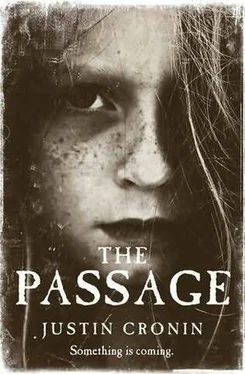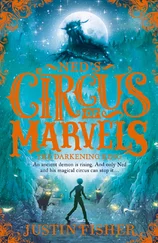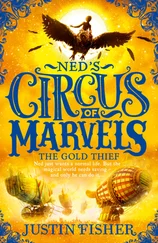The night had cooled; the windows of Auntie’s cottage were glowing faintly as Peter approached. She claimed never to sleep, that day and night were all the same to her, and in fact Peter could not recall a time when he’d failed to find her up and working. He knocked at the door and opened it a crack.
“Auntie? It’s Peter.”
From deep within he heard a shuffling of paper and the scrape of a chair on the old wood floor. “Peter, come in, come in.”
He stepped into the room. The only light came from a lantern in the kitchen, a hammered-on shack attached to the rear of the house. The space was densely cluttered but neat, the arrangement of furniture and other objects-books in towering piles, jars of stones and old coins, various knickknacks he couldn’t even identify-appearing not merely considered but possessing the intrinsic orderliness of having occupied their current position for decades, like trees in a forest. In the doorway to the kitchen, the old woman appeared, waving him in.
“You’re just in time. I’ve made some tea.”
Auntie had always “just made tea.” She brewed it from a mixture of miscellaneous herbaceous jetsam, some of which she grew and some of which she merely picked along the paths. She had been known, out walking, to make a slow, long bend to the ground to pluck out a nameless weed and pop it straight into her mouth. But drinking Auntie’s tea was simply the price one paid for her company.
“Thanks,” Peter said, “I’d be glad to take some.”
She was fussing with her glasses, picking out the right pair. She found them and slid them onto her weathered, nut-brown face-her head possessed a slightly shrunken appearance, as if the physical reductions of advanced age had moved from the top down-and located him with her eyes, smiling her toothless smile, as if then and only then had she become convinced that he was whom she believed him to be. She was clothed, as always, in a loose, scoop-necked frock of quilted fabrics, bits and pieces harvested from any number of other dresses over the years. What was left of her hair formed a vaporous tangle of white that seemed not so much to grow from her head as float in its vicinity, and her cheeks were sprayed by spots that were neither freckles nor moles but something in between.
“Come into the kitchen with you then.”
He followed her shuffling, barefooted progress down the narrow hallway to the rear of the house. The space was small, crowded by an oak table that left barely enough room to maneuver and oppressive with the heat of the stove and the steam that rose from a battered aluminum teapot resting atop it. Peter felt his pores opening with sweat. While Auntie went about her pouring, Peter raised the sash of the room’s lone window, allowing a breeze to trickle in, and took a chair. Auntie carried the pot to the table, where she placed it on an iron trivet; at the sink, she primed the pump and rinsed out a pair of mugs, which she brought to the table also.
“And to what do I owe this come-by, Peter?”
“I’m afraid I have some news. About Theo.”
But the old woman waved this away. “Oh,” she said, “I know all about that.”
Auntie sat across from him, straightening her dress on her bony shoulders as she stretched out her legs beneath her, and poured the tea into cups through a strainer. It had a thin, yellow color, like urine, and left behind in the strainer small, disturbingly biological bits of green and brown, like smashed insects.
“How it happen?”
Peter sighed. “It’s a long story.”
“I ain’t got nothing but time for stories, Peter. As long as you care to tell them, I got ears to hear by. Go on now, tea’s ready. No point letting it get cold.”
Peter took a scalding sip. It tasted vaguely like dirt, leaving behind an aftertaste of such bitterness it didn’t even seem like food. He managed a respectful swallow. On the table at his elbow was her book, the one she was always writing in. Her memory book, she called it: a fat, hand-stitched volume wrapped in lambskin, the pages covered with the tiny print she wrote in, using a crow feather and homemade ink. She made her own paper as well, boiling sawdust into pulp and forming sheets on squares of old window screens. Peter knew she was hard at work when he saw pages of this material stiffening on a line behind her house.
“How’s the writing going, Auntie?”
“It never ends.” She offered a wrinkled smile. “So much to put down, and me with nothing but time on my hands. What all that happened. The world from before. The train that brought us here in the fire. Terrence and Mazie and all those ones. All of it, I just write it down as it comes to me. I figure if there weren’t no one to do it but one old lady, then that’s what they’ll get. Someday someone will want to know what happened here, in this place.”
“You think so?”
“Peter, I know so.” She sipped, smacking her colorless lips, and frowned at the flavor. “I reckon that needs more dandelion than I put in it.” She pointed her eyes at Peter again, squinting through her glasses. “But you didn’t ask that, did you? What all do I write in there, wasn’t it?”
Her mind was like this: doubling back, forming strange connections, dipping into the past. She spoke often of Terrence, who had ridden with her on the train. Sometimes he seemed to be her brother, sometimes her cousin. There were others. Mazie Chou. A boy named Vincent Gum, a girl named Sharise. Lucy and Rex Fisher. But these wanderings through time could be interrupted, at any moment, by intervals of startling lucidity.
“Have you written about Theo?”
“Theo?”
“My brother.”
Auntie’s eyes drifted a moment. “He told me he was going down to the station. When he coming back?”
So, she didn’t know. Or perhaps she had simply forgotten, the news blending in her mind with other such stories.
“I don’t think he’s coming back,” Peter said. “That’s what I came to tell you. I’m sorry.”
“Oh, don’t go being sorry now,” she said. “The things you don’t know would fill a book. That’s a joke now, ain’t it? A book. Go on now. Drink your tea.”
Peter decided not to press. What good would it do the old woman to hear about one more person dying? He took another sip of the bitter liquid. If anything, it actually tasted worse. He felt a little burble of nausea.
“That the birch bark you feeling. For the digestion.”
“It’s good, really.”
“No it ain’t. But it does the trick all right. Clean you out like a white tornado.”
Peter remembered his other news then. “I meant to tell you, Auntie. I saw the stars.”
At this, the old woman brightened. “Well, there you go.” She quickly touched the back of his hand with the tip of a weathered finger. “There’s something good to talk about. Tell me now, how they look to you?”
His thoughts returned to that moment on the roof, lying on the concrete next to Lish. The stars so thick above their faces it was as if he could brush them with his hand. It seemed like something that had happened years ago, the final minutes of a life he’d left behind.
“It’s hard to put into words, Auntie. I never knew.”
“Well, ain’t that a thing.” Her eyes, pointed to the wall behind his head, seemed to twinkle, as if with remembered starlight. “I ain’t seen them since I was a girl. Your father used to come in just like you’re doing now and tell me all about them. I saw them, Auntie, he’d say, and I’d say to him, How they doing, Demo? How those stars of mine? And the two of us would have a nice visit about them, just like we’re doing now.” She sipped her tea and returned her mug to the table. “Why you looking so surprised?”
“He did?”
Читать дальше












